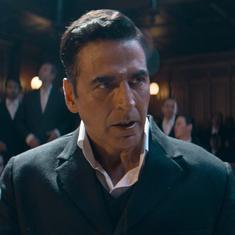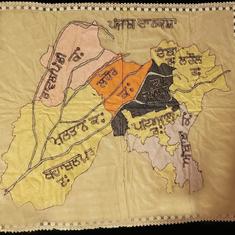Since 2006, Chief Minister Shivraj Singh Chouhan’s annual November 1 address in Bhopal on the occasion of Madhya Pradesh’s founding day focused on pledges for the speedy development of the state.
But on Tuesday, Chouhan read from a different script. A 10,000-people strong crowd at the Bhopal’s Lal Parade Ground saw an uncharacteristically belligerent Chouhan, who exhorted the crowd to raise their hands if they approved of the deaths of what he termed as “dreaded terrorists” in a questionable encounter the previous day. Eight undertrials – alleged members of the banned Student’s Islamic Movement of India, popularly known as SIMI – who had escaped from Bhopal Central Jail early on Monday, were killed later that day in the encounter.
The crowd obliged with lusty chants of “Vande Matram” and “Bharat Mata Ki Jai”.
The scene evoked memories of previous election rallies in Gujarat where Narendra Modi, then the state’s chief minister, sought a similar public endorsement for the deaths of Ishrat Jahan and Sohrabuddin, two victims of controversial police encounters in Gujarat between 2004 and 2008.
The atmosphere at the venue was already suffused with raw passion as the audience, mostly comprising Bharatiya Janata Party and Rashtriya Swayamsevak Sangh supporters, and government employees, anticipated that Chouhan would speak of the encounter. Chouhan had already set the tone for the dramatic public approval of the deaths by describing the men as “dreaded terrorists”. Justifying the encounter, Chouhan told reporters that the “timely killings” of the men saved the nation from many possible terrorist strikes and the loss of innocent lives in the future.
He also lamented the inordinate delay in the trial of the men, saying that they were being fed “chicken biryani” for years in jail while awaiting a court verdict. The reference to biryani was an attempt to link the undertrials to Ajmal Kasab, the Pakistani terrorist who was caught alive in the Mumbai attacks, convicted by a court of law and executed.
Changing power dynamics
For someone who was once seen within and outside the Bharatiya Janata Party as a moderate figure – an alternative to what many people saw as a divisive Narendra Modi – Chouhan’s transformation in the image of Modi is a reflection of the changing dynamics in the party.
Till the Modi era dawned in the Bharatiya Janata Party, Chouhan used to bask in the adulation he received from a sizeable section of the Muslim community for not hesitating to display his inclusiveness.
For instance, in 2013 he wore a skullcap while greeting Muslims on Eid at Bhopal’s Jama Masjid. A year later, months after Modi took over as Prime Minister in Delhi, Chouhan refrained from repeating this act. A young Muslim boy offered him the cap but Chouhan placed it on the boy’s head instead.
The chief minister’s annual gatherings at his residence on Eid and Christmas, also earned him the goodwill of members of the two communities who traditionally view the BJP with suspicion.
This is not to say that under his rule Madhya Pradesh has not seen communal strife between Hindus and Muslims or attacks on Christians by Hindutva goons. It has. But Chouhan, as a leader, did not shy away from reaching out to the leaders of the minority communities whenever it was required. His amiability, even if contrived, dissuaded minorities from dubbing him as anti-Muslim or anti-Christian.
However, although religious festivities at the chief minister’s residence are still being held every year, minorities have been feeling increasingly unsafe in Madhya Pradesh in the last few years. They blame the Rashtriya Swayamsevak Sangh’s overweening influence on the chief minister for the growing mistrust between the government and members of minority communities.
The Modi influence?
As long as LK Advani was the boss in the Bharatiya Janata Party, Chouhan, his blue-eyed boy in Madhya Pradesh, managed to humour the RSS with grants in academia, culture and public-funded voluntary organisations. But the chief minister kept the police and bureaucracy largely insulated from the RSS’s direct influence. At that time, the Sangh too did not exert undue pressure on Chouhan, given his close proximity with the BJP high command.
However, all that changed with the dawn of the Modi era in the party. The first sign of the tightening of the RSS grip on the Shivraj Singh Chouhan government was visible in 2014 when RSS think tank member Vinay Sahasrabuddhe replaced Union minister Ananth Kumar as the BJP incharge of Madhya Pradesh.
In April, more evidence of the RSS’s influence on the Chouhan government came when low-profile RSS pracharak Suhas Bhagat replaced Chouhan’s man Arvind Menon as the state BJP’s organisational general secretary.
After Bhagat took over, the RSS has become stridently assertive in the state party unit and the government. This is reflected in the chief minister’s apparent transformation from proponent of development to a demagogue.
Only recently, RSS pressure forced the Madhya Pradesh government to order the registration of cases of attempt to murder and robbery against seven police personnel accused of the custodial torture of an RSS pracharak in Balaghat district on September 25. Two weeks later, the RSS again prevailed upon the government to order the shifting of police officers from Gandhwani town of Dhar, and Petlawad town of Jhabua districts. The officers had been accused of rounding up RSS workers for igniting communal strife during Dussehra last month.










